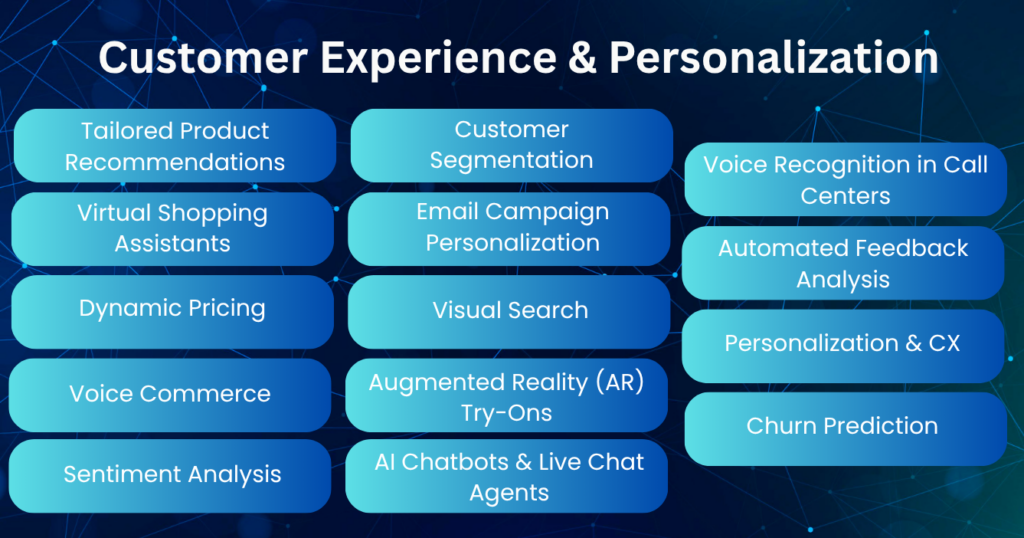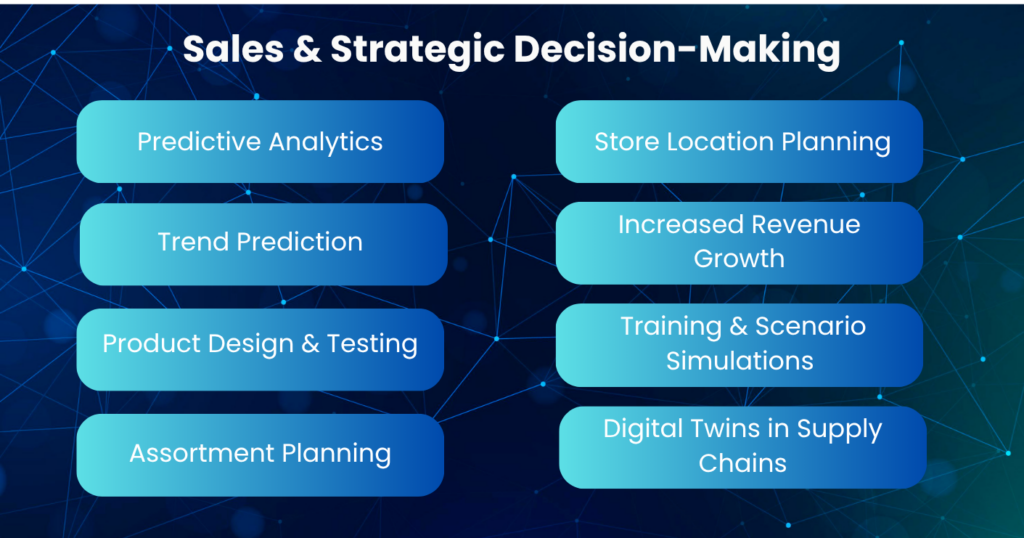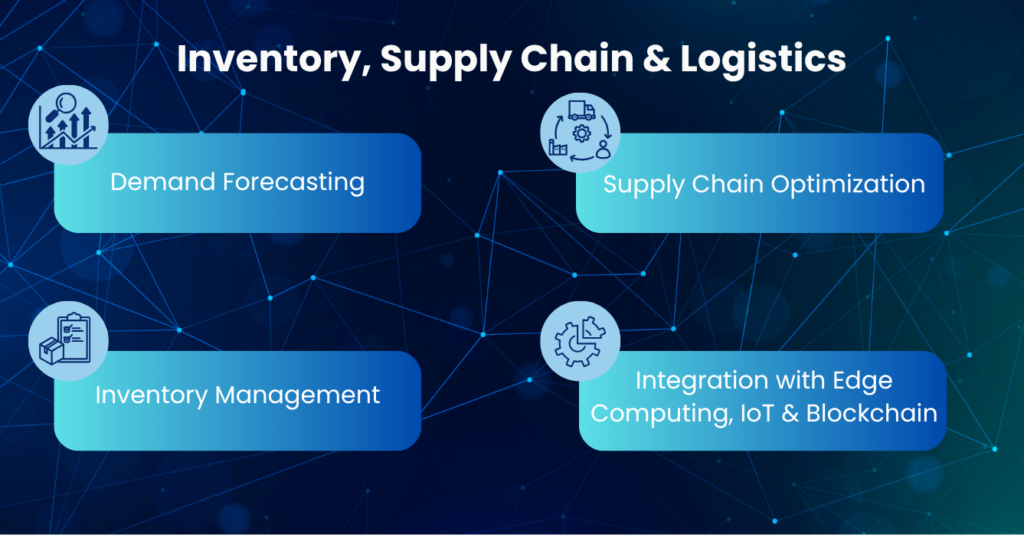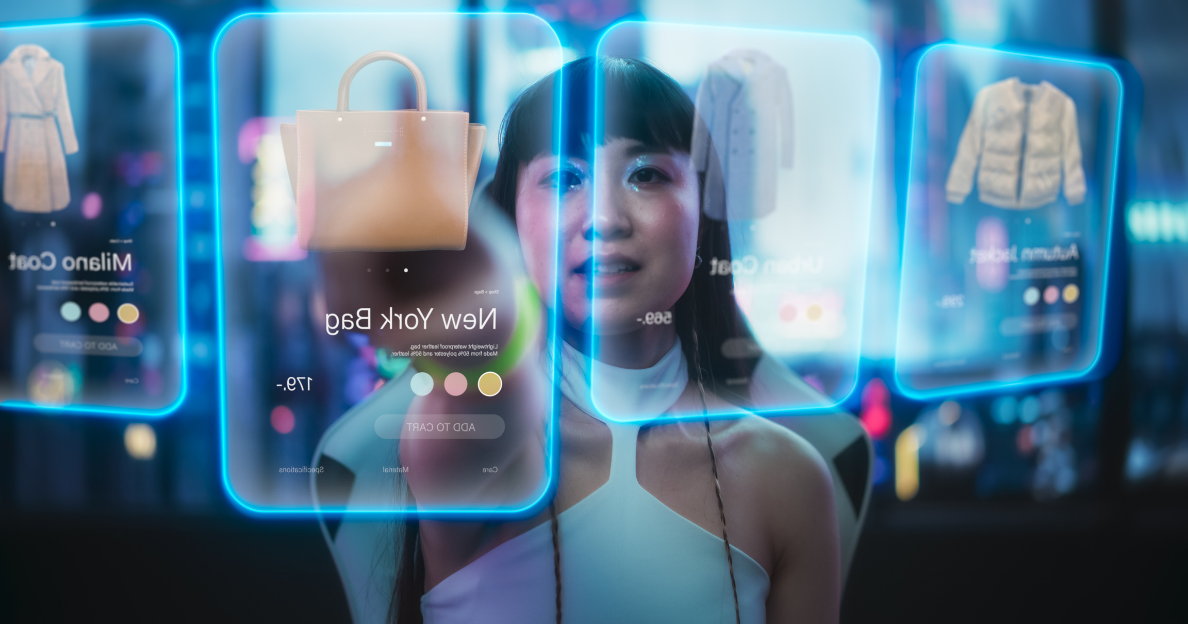“What we need to do is always lean into the future; when the world changes around you and when it changes against you…”
— Jeff Bezos
It’s time to lean in. The retail industry, globally, is undergoing transformation, and AI is reigning at the core of it. The role of AI has evolved from an operational tool being a strategic addition to revamp existing sectors. A consumer today expects more from a retail brand because of the market shift.
Retail has the maximum scope of offering personalised services to its consumers and giving them seamless checkouts with dynamic pricing and predictive analysis, and a consumer-centric approach. It is wise to leverage the AI use cases in the retail industry and create an ecosystem that boosts your revenues and productivity beyond expectations.
A 2024 McKinsey report estimates that AI could generate up to $400 billion in incremental retail profits globally, still the adoption of this brilliance varies across sub-sectors.
This blog will give a detailed understanding of all the possible AI use cases in Retail industry and help you strategize with more clarity. We’ll look at how artificial intelligence in ecommerce and physical retail alike is reframing the customer journey.
Why Use AI in Retail?
The business cases of AI in Retail industry are real and measurable; it is not just another fancy addition. Artificial intelligence today is deeply tied to growth and survival. In fact, it is a non-negotiable priority.
1. Customers Expect Personalization at Scale
Your buyers want every interaction to feel customized to their liking; therefore, AI empowers retailers to craft unique experiences using real-time behaviour and historical data. Such use of AI in retail results in higher user engagement, better loyalty, and improved conversion rates.
2. Operational Inefficiencies Drain Margin
Incorrect or outdated forecasting, overstocking, and even fulfillment delays can cause a business leader to lose millions. Implementation of AI in retail commerce can help with predictive analysis. It will result in alignment of stock levels, automate pricing, and reduce waste.
3. AI Enables Multichannel Service
AI in retail stores gives consumers the accessibility to do visual try-ons, voice commerce to self self-service kiosk. AI for ecommerce drives further convenience without any compromise. Chatbots, product recommenders, and smart search eliminate friction and empower customers to act faster.
4. Security & Compliance Require Intelligence
We live in a highly tech-centered world, where the biggest drawback is the breach of data security and constant fraud. The biggest role AI plays in all industries is data protection. Therefore, one of the primary use cases of AI in retail is fraud detection, compliance monitoring, and data protection at scale. It’s important to sell smarter and safer..
5. Adaptability is the New Strategy
The retail market is extremely dynamic. Inventory surges and sometimes dips. Trends can change overnight. The understanding and application of Gen AI use cases in Retail industry can detect signals, simulate outcomes, and optimize strategies before competitors even notice the change.
AI Use Cases in Retail
A. Customer Experience & Personalization

1. Personalized Product Recommendations
Scenario:
A fashion ecommerce platform wants to increase average order value by offering more relevant product suggestions based on browsing behavior and purchase history.
AI in Retail Solution :
AI in retail commerce can analyze a shopper’s clicks, past purchases, and demographic profile to recommend highly relevant products using collaborative filtering and real-time behavioural data. Even the use of AI for ecommerce, you can provide the user with a “complete the look” outfit bundle or top picks based on browsing. This is real-time personalization that can increase conversion rates and increase loyalty.
This is one of the most proven AI use cases in retail, creating a personalized journey at every digital and physical touchpoint.
2. Virtual Shopping Assistants
Scenario:
A home decor retailer receives hundreds of product-related queries per day. This slows down the shopping process and increases support costs.
AI in Retail Solution:
Artificial Intelligence in ecommerce enables virtual assistants to guide customers through the discovery and purchase journey. These bots interpret questions, recommend products, answer FAQs, and even assist with checkout, all of which is done without human intervention.
For AI in retail commerce, this automation increases speed-to-cart while freeing up sales associates. These assistants are not just reactive tools—they actively lead customers to their next best action.
3. Dynamic Pricing
Scenario:
A grocery chain struggles with inventory pile-up on certain SKUs, while high-demand items often run out too quickly due to static pricing models.
AI in Retail Solution:
AI-driven pricing engines adjust product prices dynamically based on factors like demand, seasonality, supply chain costs, and competitor pricing. Such AI use cases in retail strategy improve sell-through rates, reduce markdowns, and enhance margin control.
Unlike traditional price tagging, AI in retail commerce allows pricing to become an agile lever in the retail playbook, which is updated hourly if needed.
4. Voice Commerce
Scenario:
A customer using a smart home assistant wants to reorder a specific detergent without browsing the app or website.
AI Retail Solution:
This is one of the best AI use cases in retail. AI-integrated voice commerce enables users to browse, reorder, or track products using voice commands. Retailers using AI in retail for voice search make their product catalogs accessible via Alexa, Siri, or Google Assistant. These AI use cases in retail dramatically improve accessibility and support hands-free commerce, critical for multitasking users and mobile-first markets.
5. Sentiment Analysis
Scenario:
A cosmetics retailer launches a new skincare line but is unsure how customers are reacting across online reviews and social platforms.
AI in Retail Solution:
Gen AI use cases in the retail industry really boost the business. AI in retail is capable of analyzing reviews, tweets, and chat transcripts, using natural language processing (NLP), to detect sentiment trends—positive, negative, or neutral. It pinpoints common praises, complaints, and unmet expectations.
This application of artificial intelligence in ecommerce allows brand managers to iterate product strategy, improve messaging, and respond quickly to emerging issues.
6. Customer Segmentation
Scenario:
An omnichannel clothing brand wants to tailor its loyalty programs but currently uses broad demographic buckets for targeting.
AI in Retail Solution:
AI algorithms cluster customers by behavior, purchase cadence, value, and channel preference. This granular segmentation supports hyper-personalized campaigns, from VIP-only offers to churn-risk win-backs.
This is a foundational AI use case in retail, enabling marketers to replace guesswork with precision and relevance at every touchpoint.
7. Email Campaign Personalization
Scenario:
A D2C skincare brand sends generic promotional emails and sees below-average open and click-through rates.
AI in Retail Solution:
Artificial intelligence in ecommerce uses customer data to personalize email subject lines, content blocks, and send times. Based on browsing behavior and prior purchases, it tailors each email to increase relevance and engagement.
For brands focused on AI for ecommerce, this delivers measurable lift in ROI across retention, upsell, and cart recovery campaigns.
8. Visual Search
Scenario:
A shopper finds a furniture style on Pinterest and wants to locate something similar on a retail site without knowing what to search for.
AI in Retail Solution:
AI visual search lets customers upload an image to instantly surface visually similar products from the retailer’s catalog. This innovation of AI in retail commerce simplifies discovery, shortens time-to-purchase, and improves conversion for visually driven segments like home decor, fashion, and accessories.
9. Augmented Reality (AR) Try-Ons
Scenario:
A beauty retailer sees high return rates for lipstick and foundation products because customers can’t visualize them pre-purchase.
AI in Retail Solution:
Shoppers can virtually try on products via an app or a web by using AR powered by AI in Retail industry. The system maps color tones to their skin type and recommends shades, minimizing trial-and-error.
This kind of AI in retail stores strategy builds buyer confidence, reduces returns, and creates a more immersive shopping experience, especially in beauty, fashion, and eyewear.
10. AI Chatbots & Live Chat Agents
Scenario:
An electronics retailer’s support team is overwhelmed during a holiday sale, leading to long response times and lost sales.
AI in Retail Solution:
AI chatbots triage customer inquiries instantly, resolving common issues or routing complex ones to live agents with context. These bots can handle multilingual queries, order tracking, and product recommendations. Such Gen AI use cases in retail industry give the buyer a sense of satisfaction too.
As AI use cases in retail mature, these tools shift from cost-reduction assets to revenue-driving interfaces.
11. Voice Recognition in Call Centers
Scenario:
A luxury fashion retailer wants to reduce dropped calls and misrouted queries in their voice-based support center.
AI in Retail Solution:
AI-powered voice recognition can identify intent, emotional tone, and urgency in real time, routing the customer to the right agent or response system. This ensures frictionless experiences and supports personalized voice interaction, which is a rising trend in AI in retail industry service delivery.
12. Automated Feedback Analysis
Scenario:
A shoe retailer receives thousands of product reviews and customer survey responses each month, but struggles to identify actionable themes.
AI in Retail Solution:
AI in retail commerce automates the classification and analysis of structured and unstructured feedback, surfacing trends like sizing issues or quality defects.
For enterprise-scale brands, this AI for ecommerce use case translates voice-of-customer into product and service innovation, without manual effort.
13. Personalization & CX
Scenario:
A customer adds items to their cart via mobile, then visits the store to complete the purchase, but the experience feels disconnected.
AI in Retail Solution:
Omnichannel AI systems unify customer data across various platforms such as app, web, store, email, and customize experiences accordingly. AI in retail commerce makes transitions seamless and meaningful for anything from personalized app homepages to in-store offers synced to browsing history.
14. Churn Prediction
Scenario:
A subscription-based meal kit service sees a decline in repeat orders but can’t pinpoint why or whom to re-engage.
AI in Retail Solution:
AI models flag customers who are at risk by analyzing engagement patterns, order frequency, complaint history, and sentiment. It then recommends retention strategies like discounts or reactivation prompts.
This is a critical AI use case in retail, helping brands preserve lifetime value and reduce customer acquisition costs.
B. Sales & Strategic Decision-Making

This category explores how AI in retail supports executive decisions, boosts top-line growth, and shapes future-facing strategy. Each of these AI use cases in retail is designed for long-term business impact and board-level visibility.
1. Predictive Analytics for Sales Forecasting
Scenario:
A global fashion brand struggles to plan inventory and marketing budgets due to unpredictable sales trends across regions.
AI in Retail Solution:
AI-powered forecasting tools analyze historical sales, promotions, economic indicators, and seasonality to project sales performance with high accuracy. These tools simulate multiple demand scenarios and offer confidence intervals for decision-makers.
This application of ai in retail industry reduces planning risk, informs procurement, and aligns inventory levels with market dynamics, ensuring retail leaders act on insight, not instinct.
2. Trend Prediction + Improved Decision-Making via Data Insights
Scenario:
A D2C lifestyle brand wants to capitalize on emerging trends before they saturate the market, but lacks real-time intelligence.
AI in Retail Solution:
AI scans social media, search trends, and consumer behavior to detect signals that point to emerging styles, preferences, or unmet needs. It also correlates disparate data sources (e.g., search trends + SKU performance + competitor pricing) to produce executive dashboards.
This Gen AI use case in retail industry helps C-suites move from reactive to anticipatory strategy, making every decision faster, smarter, and more profitable.
3. Product Design and Testing (via Market Insights)
Scenario:
A sportswear retailer is launching a new product line and wants to reduce the time and risk associated with traditional product testing.
AI in Retail Solution:
AI analyzes market sentiment, customer feedback, past design successes, and competitor products to simulate product-market fit. Before finalizing a launch, AI predicts demand potential and highlights optimization opportunities.
This artificial intelligence in ecommerce application reduces failed launches, accelerates speed-to-market, and increases the ROI on new SKUs.
4. Assortment Planning
Scenario:
A home improvement retailer stocks the same products across stores in different regions, leading to low turnover and excessive markdowns.
AI in Retail Solution:
AI in retail industry identifies patterns in customer demand, regional behavior, and environmental factors (e.g., climate, housing type) to optimize assortment by store or region. It also simulates assortment shifts to measure revenue impact before implementation. This is a high-impact AI use case in retail that ensures shelf space is optimized based on local tastes and demand elasticity.
5. Store Location Planning
Scenario:
A growing retail chain is unsure where to open its next flagship location and wants to predict future success by location type.
AI in Retail Solution:
AI evaluates real estate costs, population demographics, foot traffic, historical data, and nearby competition to score potential store locations. These tools also simulate financial outcomes over multi-year horizons. This AI in retail commerce application supports capital-intensive decisions with data-backed confidence, reducing risk and maximizing expansion ROI.
6. Increased Revenue Growth
Scenario:
A lifestyle brand is plateauing in revenue growth despite increasing ad spend and SKU expansion.
AI Solution:
By connecting Artificial Intelligence across marketing, pricing, customer segmentation, and personalization, retailers can identify untapped growth levers. AI pinpoints the exact audiences that convert best, what promotions underperform, and where pricing elasticity can be used to increase value per order. This integrated approach to AI in retail drives growth not just from new customers, but from smarter monetization of existing ones.
7. Generative AI for Training & Scenario Simulations
Scenario:
A retail leadership team needs to train regional managers on handling complex business scenarios, like inventory shocks or seasonal surges.
AI in Retail Solution:
Generative AI creates simulation-based training environments, complete with branching decision paths, real-time feedback, and KPI impact analysis. It models disruption scenarios (e.g., vendor delays, demand spikes) to prepare managers for high-stakes decision-making. This unique Gen AI use case in retail industry enhances strategic readiness and empowers mid-level leadership with hands-on learning.
8. Digital Twins in Supply Chains
Scenario:
A retailer’s logistics team wants to test new fulfillment models without disrupting current operations.
AI in Retail Solution:
Using digital twins– virtual replicas of the physical supply chain, AI simulates routing, inventory flow, warehouse layout, and fulfillment strategies. The teams can test “what-if” scenarios, assess impact, and de-risk operational changes. For AI in the retail industry, this is an amazing leap for agile planning, cost optimization, and innovation in logistics design.
C. Inventory, Supply Chain & Logistics

The heartbeat of every retail operation lies in its ability to forecast accurately, stock efficiently, and deliver reliably. AI in Retail Industry offers the precision and agility needed to modernize these core functions. These AI use cases in retail turn complexity into a competitive advantage.
1. Demand Forecasting
Scenario:
A national grocery chain regularly overestimates holiday demand and underestimates back-to-school inventory, leading to both spoilage and stockouts.
AI in Retail Solution:
AI-powered demand forecasting combines historical sales data, local events, weather patterns, and consumer behavior to generate accurate product-level forecasts. Unlike static models, AI adapts in real-time to new signals and anomalies.
This ai in retail application ensures the right products are available at the right time, minimizing waste, reducing lost sales, and aligning supply with true demand.
2. Inventory Management
Scenario:
A multi-brand retailer suffers from misplaced stock, slow replenishment, and poor visibility into SKU performance across locations.
AI in Retail Solution:
AI automates inventory tracking, using machine vision, RFID data, and POS integration to monitor stock levels in real time. It predicts reorder points, identifies anomalies, and triggers automated restocking workflows. This AI in retail commerce solution dramatically reduces manual checks, cuts carrying costs, and ensures fast-moving items are never out of stock.
3. Supply Chain Optimization
Scenario:
A big-box retailer experiences recurring delays in order fulfillment due to fragmented logistics planning and lack of real-time visibility.
AI in Retail Solution:
AI evaluates transportation routes, warehouse loads, delivery SLAs, and real-time traffic to optimize end-to-end supply chain flows. It also enables predictive risk management by identifying potential disruptions before they escalate. This core AI use case in retail industry enhances service reliability, lowers fulfillment costs, and builds a more agile, responsive network.
4. Integration with Edge Computing, IoT, and Blockchain
Scenario:
A home appliance retailer wants to connect data across warehouses, stores, and delivery fleets but struggles with latency and fragmentation.
AI Solution:
Edge computing and IoT sensors provide real-time data from shelves, trucks, and smart bins, which AI uses for instant decision-making. Blockchain ensures traceability and transparency in sourcing, shipment, and payments. Together, these technologies create an intelligent infrastructure where AI in retail industry applications can operate faster, more securely, and at scale.
D. Security & Fraud Prevention

As digital transactions grow and data volumes explode, securing retail systems has never been more critical. AI enables real-time monitoring, pattern recognition, and compliance enforcement, protecting revenue and customer trust. These AI use cases in retail help future-proof both online and offline operations against threats and inefficiencies.
1. Fraud Detection in Transactions
Scenario:
An electronics retailer experiences a surge in suspicious refunds, duplicate orders, and high-value purchases using mismatched billing data.
AI in Retail Solution:
AI models trained on known fraud patterns analyze real-time transactions for anomalies, such as unusual locations, synthetic identities, or high-risk payment behavior. These systems can pause orders for manual review or flag users for additional verification. This is one of the most valuable AI use cases in retail commerce, especially for high-ticket or repeat-purchase products, enabling brands to reduce chargebacks and protect revenue.
2. Cybersecurity (E-commerce & Payments)
Scenario:
A fashion retailer’s online store suffers a data breach, exposing customer credit card and address information.
AI in Retail Solution:
AI-based cybersecurity platforms monitor server activity, login behavior, and data flows to detect breaches or malicious bots in real time. These tools can automatically shut down compromised access points or alert administrators to take immediate action. In AI for ecommerce, this is essential to maintain compliance, customer trust, and operational continuity.
3. Data Privacy Governance & Ethics Monitoring
Scenario:
A retailer deploying AI for personalized marketing is under pressure to demonstrate that its systems respect consumer privacy and avoid algorithmic bias.
AI in Retail Solution:
AI governance frameworks audit data inputs, track how customer data is used, and validate compliance with GDPR, CCPA, and other regional mandates. Ethical monitoring ensures algorithms are explainable, fair, and non-discriminatory. This Gen AI use case in retail industry protects brand reputation while enabling innovation, showing that responsible AI can be a strategic differentiator.
E. Future-Ready Infrastructure
Looking ahead, retailers are not just implementing AI; they’re integrating it into the core of their digital ecosystems. This final category highlights AI’s evolving role as the connective tissue linking emerging technologies, systems, and retail functions.
AI Integration as Central Intelligence Layer
Scenario:
A large retail conglomerate operates with siloed systems for POS, marketing, logistics, and customer service, limiting visibility and agility.
AI in Retail Solution:
AI acts as the central intelligence layer across the business, integrating data from IoT sensors, edge computing devices, AR platforms, ERP systems, and generative tools. It orchestrates real-time decision-making across all nodes—from forecasting and personalization to fraud detection and logistics. This foundational AI in retail industry approach turns fragmented systems into a unified, intelligent enterprise, ready to adapt, scale, and lead in a connected world.
Conclusion
AI in retail has moved beyond hype. It’s now a strategic imperative. From personalized experiences to intelligent operations and secure transactions, the most competitive retailers use AI to optimize every business layer.
The use cases are clear. The impact is measurable. And the opportunity is now.
Retailers that embrace AI use cases in retail, backed by data, aligned goals, and smart execution, will lead the next era of commerce. Those who delay risk falling behind in a market that rewards speed, personalization, and precision.
It’s not about experimenting with AI anymore. It’s about scaling it, with intention.
Maximize Efficiency with Expert AI Consulting
Discover how our tailored AI strategies can optimize operations, automate workflows, and drive innovation across your business.



